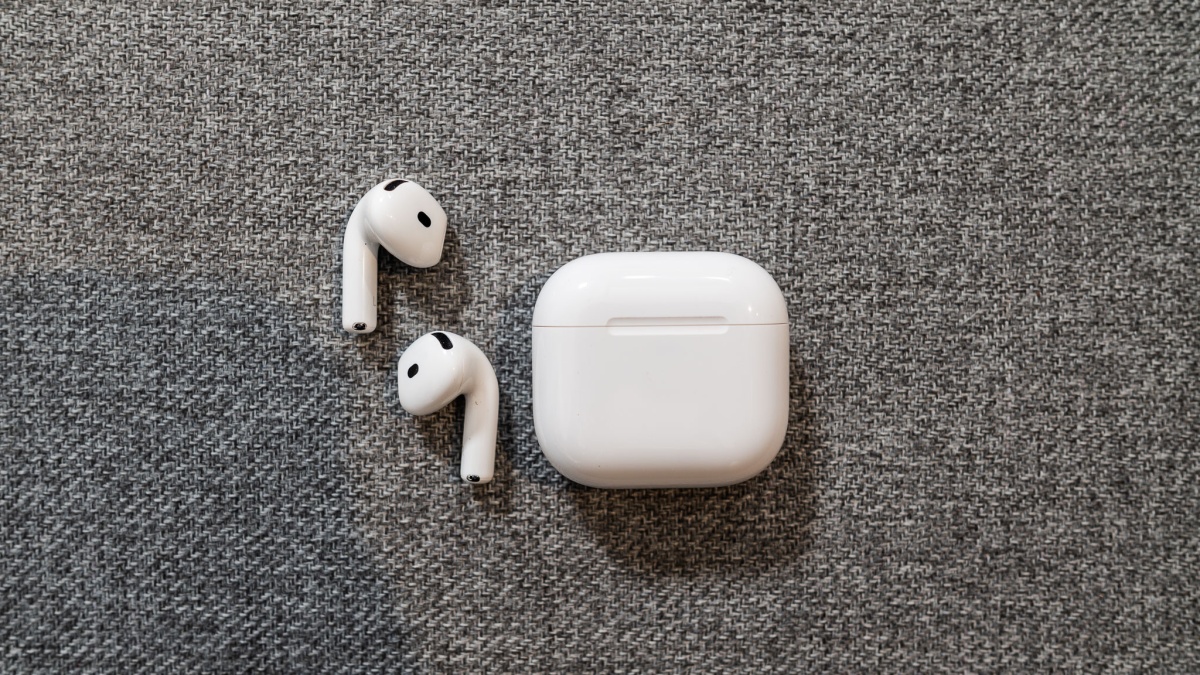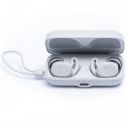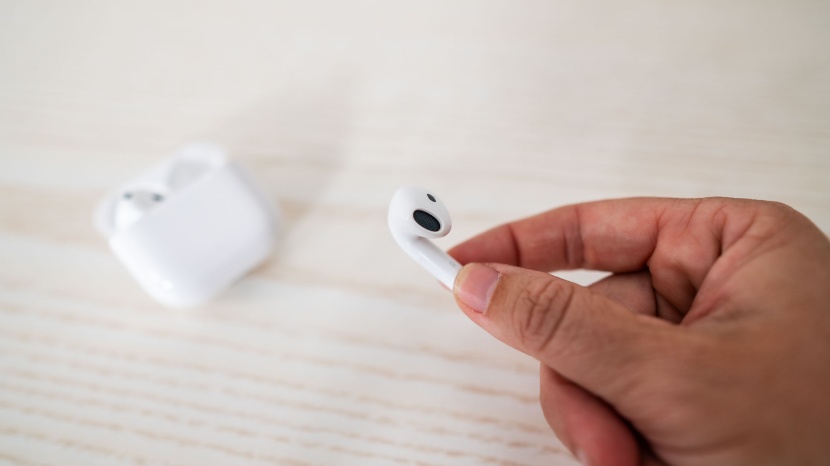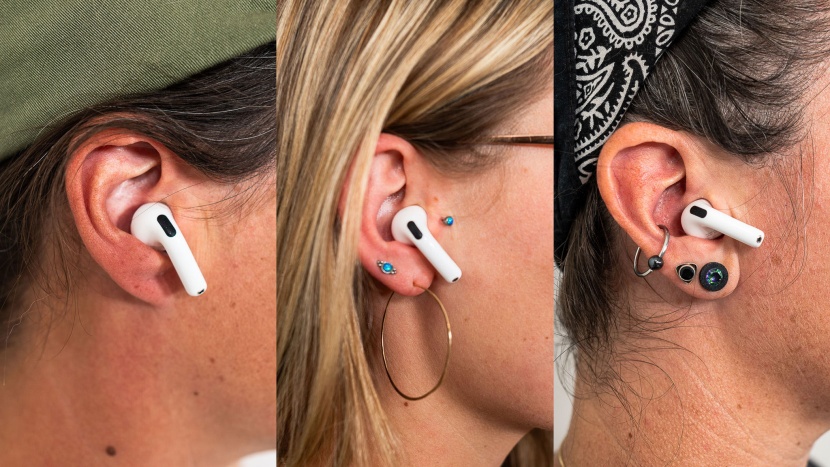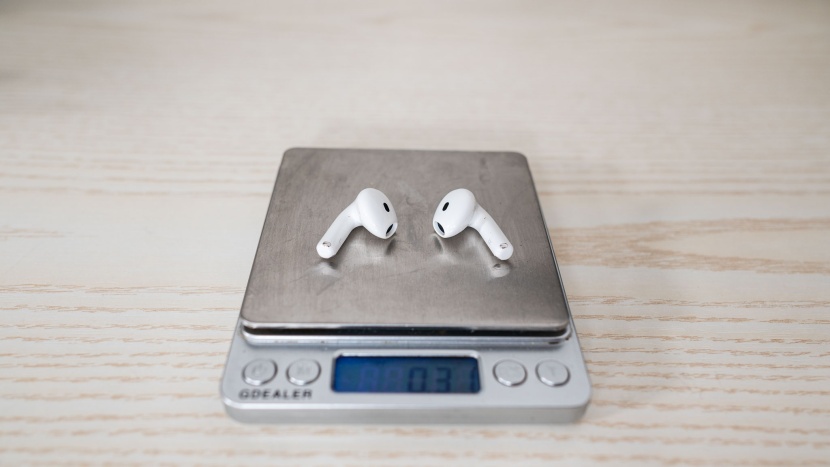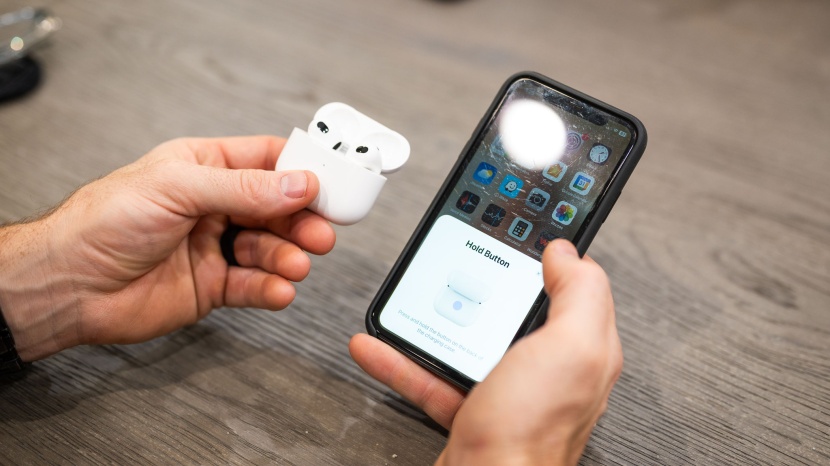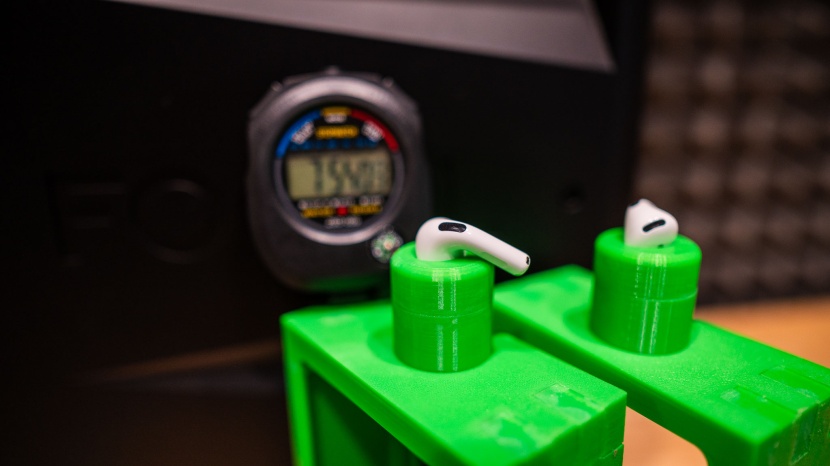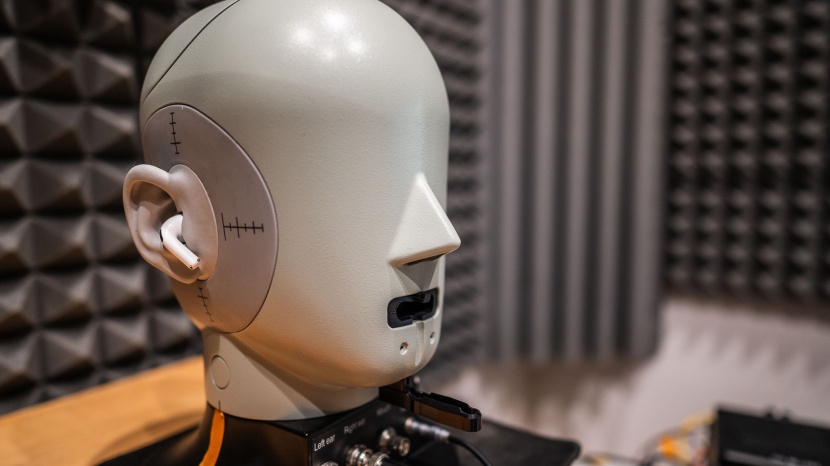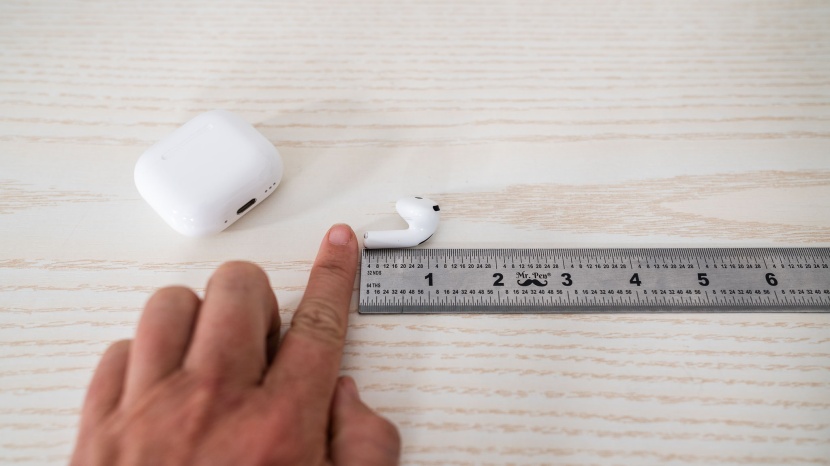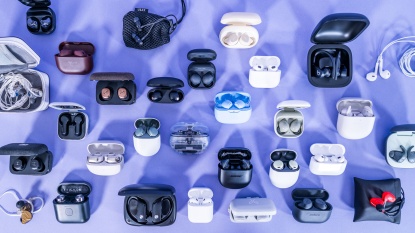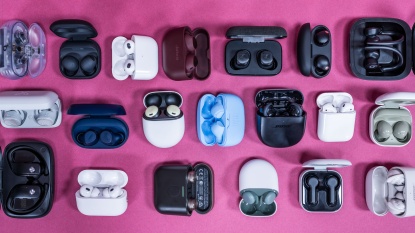Apple AirPods 4th Gen - ANC Review
Our Verdict
Compare to Similar Products
 This Product Apple AirPods 4th Gen - ANC | |||||
|---|---|---|---|---|---|
| Awards | Bargain Bin Alert - Great Exercise Buds | Bargain Bin Alert! Watch for Low Prices | Best Budget Wireless Earbuds | Best Wireless Earbuds on a Tight Budget | |
| Price | $179 List $168.99 at Amazon | $200 List | $230 List $106.85 at Amazon | $150 List | $50 List $34.99 at Amazon |
Overall Score  |
|||||
| Star Rating | |||||
| Bottom Line | Added ANC and solid improvement over previous AirPods, but we still recommend other options | Long lasting battery life, impressive water resistance, comfort, and great sound quality make these an easy choice | These are comfortable with reasonable audio quality at a lower price point than most | These buds offer an impressive soundstage and sturdy construction — if they fit | If you don't need noise cancelation or top-notch audio, these are a good deal |
| Rating Categories | Apple AirPods 4th G... | Jabra Elite 8 Active | Samsung Galaxy Buds... | Jaybird Vista 2 | Amazon Echo Buds |
| Sound Quality (40%) | |||||
| User Experience (20%) | |||||
| Noise Cancellation (15%) | |||||
| Battery life (15%) | |||||
| Call Quality (10%) | |||||
| Specifications | Apple AirPods 4th G... | Jabra Elite 8 Active | Samsung Galaxy Buds... | Jaybird Vista 2 | Amazon Echo Buds |
| Active Noise Cancelling | Yes | Yes | Yes | Yes | No |
| Earbud Location Tracking | Yes | Yes | Yes | Yes | Yes |
| Measured Battery Life | 5.6 hr | 11.9 hr | 7.5 hr | 6.3 hr | 5.9 hr |
| Waterproofing | IP54 | IP68 | IPX7 | IP68 | IPX2 |
| Measured Weight | 0.15 oz | 0.18 oz | 0.19 oz | 0.24 oz | 0.18 oz |
| Quick Charging | 5 mins = 1 hr | 5 mins = 1 hr | 5 mins = 1 hr | 5 mins = 1 hr | 15 mins = 2 hrs |
| Charges Per Case | 5 | 3 | 3 | 2 | 3 |
| Wired Charging Port | USB-C | USB-C | USB-C | USB-C | USB-C |
| Wireless Charging Option | Yes | Yes | Yes | Yes | No |
| Claimed Battery Life | 7 hrs | 14 hrs | 8 hrs | 8 hrs | 5 hrs |
| Charging Carrying Case | Yes | Yes | Yes | Yes | Yes |
| Transparency Mode | Yes | No | Yes | Yes | No |
| Multipoint | Yes | Yes | No | No | No |
| In-ear Detection | Yes | Yes | Yes | Yes | Yes |
| Multiple Ear Tips | N/A | Yes | Yes | Yes | Yes |
Our Analysis and Test Results
The Apple AirPods 4th Generation made significant strides compared to previous generations, even offering active noise cancellation in this version (ANC). Still, there are many high-performing and more comfortable options out there.
Sound Quality
Our team of audio specialists dedicated countless hours to testing the Apple AirPods 4th Gen, closely listening to an extensive playlist and evaluating their experience over time. We found that they sound considerably better than all previous AirPods, with an enormous improvement in the bass frequencies. They're not exactly great, but they sound great for an AirPod.
While you can now hear bass frequencies in the mix, they lack power, making them a disappointing option for genres like hard rock, EDM, and hip-hop. Turning up the volume does nothing to bulk up the relatively thin lower registers. These earbuds do their best work in the mid-range frequencies, with vocals, strings, and some synths sounding clean and realistic beneath crisp highs. If you like classical, jazz, light rock, or audiobooks, these buds will work.
The high-end frequencies come through clearly, with precision and focus. Unlike the 3rd generation version, they don't get lost behind the clutter of any ambient noises. They could use a little more pop and sparkle to wow us, but they're adequate as is. In Van Morrison's “Into the Mystic,” for example, the high guitar notes and cymbal crashes are crisp with a smooth edge.
The well-defined mid-range is where these earbuds come into their own. Though they lack the warmth and richness of top-scoring options, they're full without overpowering the mix. Mid-focused tracks like “Bohemian Rhapsody” by Queen shine, letting us enjoy the excitement of the swings in dramatic fashion.
Stripped-down tracks like “Jersey on the Wall (I'm Just Asking)” by Tenille Townes showcases the detailed clarity in the mids. Where raw, emotional vocals dominate, the mid-range is complex enough to allow multiple layers to sparkle. “Every crackle, breath, and nuance in her voice comes through over the delicate acoustic guitar,” noted our audio expert, adding a steady backdrop without overpowering the track. The song's simplistic beauty shines right through.
The bass frequencies aren't epic, but they're much better than previous versions of these earbuds, where I often struggled to detect them at all. Tracks like “Changes” by Allie Crow Buckley demonstrate an audible low-end, with the introduction of a synth bass line at 0:47, adding warmth and body beneath her airy, ethereal vocals.
These earbuds fall short for listeners seeking powerful, thumping basslines. I don't recommend them for genres like hip-hop, EDM, and hard rock. Tracks like “Panini” by Lil Nas X lack the thumping low-end that drives the energy of the song. Check timestamp 0:12 for an example.
I often find myself turning up the volume to capture finer details, with the ANC feature allowing me to do so effectively. Bass frequencies tend to fade at lower volumes and nearly disappear at the softest levels. These earbuds suffer from a drop in clarity and sound quality at higher volumes. They also lack power.
I find that there is a sweet spot in between, and I appreciate that I don't have to play the music as loudly as I did with prior generations to enjoy a balanced sound.
Soundstage
The term “soundstage” refers to the sense of space that earbuds can create. For example, when you hear a violin, does it sound like it's being played in an open concert hall or a corridor? High-quality earbuds are able to separate each element and give it enough space to resonate. A good soundstage makes for an immersive, concert-like experience, as though the music were surrounding you.
Though these earbuds don't create the largest, most immersive soundstage in the test, it's much improved from previous versions. The stereo spread is broader than before, allowing us to appreciate each layer of the music separately and enjoy a more expansive whole. Rock songs like “The Spirit of Radio” by Rush take advantage of the sense of space in its raucous buildup from 0:01 to 0:40.
Their lack of a solid seal in your ear keeps them from creating a truly immersive audio experience, though. Even with the ANC on, background sounds can easily pull you out of the concert and into reality.
Frequency Response
To evaluate the sound quality objectively, we employed our Brüel & Kjaer Type 5128 Head Simulator and SoundCheck software to measure and chart the earbuds' frequency response. We then compared it to our ideal GearLab House Curve, which is the optimal sound profile for earbuds in our experience.
The noise canceling version of the Apple AirPods 4th Gen is similar to the non-ANC version but with a bit more emphasis on the bass frequencies around 90 Hz. This brings a richer sound to the songs we love. The lowest and highest bass notes still feel a bit anemic, and the chart shows why.
Though the 4th Gen doesn't correspond to our idealized house curve than previous generations, it is less dramatic, which often translates to smoother sound quality overall. And, though the gain starts low in the bass frequency range, they are more pronounced in the sound mix when I critically listened in my testing. The elevated mids perform well, and although the treble could benefit from more emphasis, it's still clear and present in the mix.
User Experience
To assess how easy these AirPods are to use, we recruited the GearLab team to test their comfort and fit across a variety of ear shapes and sizes. We also wore them during a range of activities, from office days and mellow commutes to workouts and bike rides. We also reviewed the app, focusing on its features and ease of use. Echoing the same pattern as sound quality, while the user experience is better than before, there's still room for improvement.
Comfort
One of our favorite upgrades of this generation of AirPods is their improved comfort. Shorter stems and reduced bulk help them settle more comfortably and securely in the ear. None of our testers, regardless of ear size, reported pressure points or sustained discomfort.
While I'm impressed with the strides Apple has made, I still find that earbuds with customizable silicone or foam tips feel better, especially for extended wear. I do find that the case for these earbuds is more comfortable in our pockets since it's slimmer than most.
Stability
Since they lack a secure seal, these earbuds never feel fully stable. The slick, hard plastic casing is so smooth that it can be hard to hold onto with your hands, let alone your ears. And, even though the stems are shorter than previous versions, they still tend to get caught on clothing or hair, yanking the earbuds out unexpectedly.
Customization
Apple's AirPod settings are easy to use but minimalistic, providing few options to customize your experience. You can monitor the battery life of the earbuds and the case, check that the earbuds fit well, and enable features like Adaptive EQ and Spatial Audio. However, since the earbuds don't offer interchangeable ear tips, all you can do to adjust the fit is reposition them slightly. And I didn't notice much difference in sound quality or security when I did.
Similarly, the adaptive EQ and spatial audio features only offer subtle sound enhancement. While other earbuds blew my mind with similar features, I could barely detect a shift with the AirPods. If you do use the adaptive EQ feature, which adjusts the mix in real-time based on how the AirPods fit in your ear, you can't turn on the ANC, which does more to improve audio quality in our experience.
Since Apple shifted to USB-C cords, the AirPods no longer come with a charging cable, which is inconvenient if all you have on hand are the older lightning cables. Android users will have even less control over these earbuds, losing any Apple-exclusive features. In that case, these essentially become basic Bluetooth earbuds.
Connectivity
To test their connectivity, I noted any issues pairing with our testing phones and any difficulties using their features, such as lag time during video playback. It's worth noting upfront that Apple earbuds do not work well with Android phones. You need an Apple phone to access all the features, so I don't recommend mixing and matching. Aside from recording any real-world issues, I also scoured Amazon's 1-star user reviews to see how frequently users mention connectivity issues. Since the AirPods 4 are so new, I don't have a large enough statistical pool to grab from, so we'll keep checking and keep you in the loop in future updates.
Noise Cancellation
The key difference between this version of the 4th Generation Airpods and the other AirPod models we tested is that these include active noise cancellation (ANC). For ANC to work well, earbuds need to create a good seal in your ear, and the software must be capable of quieting surrounding sounds. Airpods lack the type of ear tips that provide a tight seal, so they can't compete with the best ANC earbuds we tested.
When the ANC is activated, these earbuds manage to soften ambient sounds, making it easier to focus on your music without straining. It makes for a slightly improved audio experience. Compared to other AirPods, most of which do not offer ANC, this feature is an improvement. But it's not powerful enough to fully relegate surrounding sounds to the background like our favorite models, and honestly, it's a far cry from our top performers. That's why these buds still fall into the lower tier compared to sealed designs. Still, they're surprisingly effective for an open-ear style.
To assess the noise isolation and ANC of the Airpod 4th Gen earbuds, we used the Bruel & Kjaer 5128-B tester and SoundCheck software to measure their effectiveness at reducing ambient noise in a bustling café environment. The chart above illustrates the test results, and you can watch the testing process in the video below.
As you can hear, these earbuds don't offer much passive noise isolation, which wasn't much of a surprise based on their design. When earbuds possess soft ear tips that mold to your ear, they perform much better in this area, especially at higher frequencies, so you can block out those annoying sounds like clanking plates.
The chart above presents SoundCheck's analysis findings for the 4th Gen AirPods with active noise cancellation. While they fall far short of our favorite options, they reduce ambient sounds by about 10 decibels from the mid-bass to the high-mid range (from about 70 to 2000 Hz). In the low and mid-treble range, these buds provide even more protection from pesky distractions, lowering the surrounding sounds by about 15 decibels. For noise-canceling earbuds, it's a subpar showing. As far as AirPods are concerned, it does a lot to improve the quality of your listening experience.
Battery Life
We evaluated the Apple AirPods 4th Gen earbud's battery life by setting them to 75% volume, as we did with every other earbud in the test, and playing them until they powered off. They exceeded Apple's claims of a 5-hour run time, playing for 5 hours and 40 minutes without the ANC activated. With ANC, Apple claims that they last around 4 hours.
While their battery life is on the lower end compared to other earbuds we've tested, it's generally sufficient for most users. The case holds an additional 5 charges, providing around 28 hours of playtime before you need to find an outlet. A quick 5 minutes on the charger will give you another hour of runtime. So, as long as you're good about storing them in their case during meetings or breaks, you should have plenty of juice to get you through the day.
Call Quality
To test the call quality of these AirPods, we tested their microphone's ability to isolate a female and male tester's voice from background noises in three scenarios — in a quiet room, an office environment, and a screeching subway platform. We use SoundCheck software and the Brüel & Kjaer 5128-B head and torso simulator to evaluate the quality of each call. You can also listen for yourself in the videos and audio clips below.
These earbuds provide average call quality in each scenario. Our testers' voices sound pretty good, if a bit grainy. Take the quiet room test, where the man's voice is slightly muffled and the woman's is clear. Both are slightly distorted, but you can easily understand them.
You can also hear the voices over the light hum of office noise, but the background sounds are still audible in the background.
With subway sounds blaring in the background, both the man's and woman's voices are clear, though the background noise is more noticeable than with some other models. Despite this, the voices are easy to understand.
Should You Buy the Apple AirPods 4th Gen?
The Apple AirPods 4th Gen earbuds don't earn high scores in our tests and don't excel in any particular area. There are better options that don't cost much more and a few that even cost less. However, if you're integrated into the Apple ecosystem and can't afford the Pros, these are a passable choice, especially if you prefer an open-ear design over the sealed feel of ear tips. Keep in mind, though, that they aren't the best choice if you need a more secure option for active use.
What Other Earbuds Should You Consider?
If you're determined to purchase Apple earbuds, the only ones we recommend are the Apple AirPods Pro 2. They are much more expensive but address all the shortcomings of the typical AirPods. If you're willing to explore outside the Apple ecosystem or are already an Android user, there are many excellent options to choose from. We'd recommend the Jabra Elite 10 Gen 2, Bose QuietComfort Ultra, or Google Pixel Buds Pro. Though they're more expensive, they offer better sound quality, noise cancellation, user-friendly apps, and a more secure, comfortable fit.


